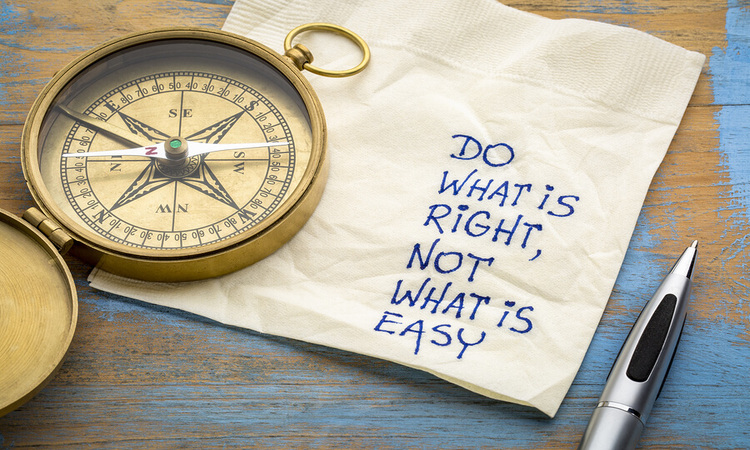
Step 4 of Alcoholics Anonymous – “Made a searching and fearless moral inventory of ourselves.” The fourth step in the Alcoholics Anonymous 12-step journey to sobriety requires the member to recognize their own weaknesses. This action often demands both extraordinary courage and humility.
Facing Ourselves
People drink alcohol or use drugs for many different reasons. Substance abuse is compelled by a wide variety of emotions, including fear, guilt, anger, resentment, depression, and excitement. Only by understanding these emotions and our weaknesses can we hope to overcome them.
Through honest introspection, we see ourselves as we are, and not as precisely what we would like to imagine. Once a person can do that, he or she can begin the unpleasant process of change.
Step 4 reflects the moment when a person must confront the truth, which can be both painful and frightening. It’s difficult to accept and admit to ourselves that we are not perfect, and are instead profoundly flawed. For some, this can be a humiliating experience. We can, of course, take solace in the fact that we are not alone, and that everyone else also has many faults.
We can also remind ourselves of one vital fact: the devil you know is better than the one you don’t. It is usually the perils we cannot see that are the most dangerous. To correctly evaluate a situation and respond appropriately, we must first turn the spotlight on ourselves and confront our own misgivings and failings.
We must ask ourselves several important questions. For example, what is it, exactly, that prevents us from becoming sober? What character flaws or feelings create a barrier between ourselves and success? What are the emotions, behaviors, and events that have contributed to our downward spiral? Which relationships are toxic? Start with the obvious, then keep examining inward in more detail.
Taking Responsibility for One’s Shortcomings
Unfortunately, the ego is often a barrier to accurate self-assessment. Self-importance and clever yet false justifications obstruct the path ahead. Simply put, pride impedes progress.
Many deny to themselves and others that they have significant character flaws. In the end, most of us find it easier to blame other people for contributing to our alcohol abuse. We point the finger at everyone, and everything, except ourselves.
During step 4, this is the time when all these justifications must fall away, and we begin to hold ourselves accountable for our actions. Fortunately, no AA member has to handle this task alone. They have other peers to lean on for support, and sponsors to hold them responsible for their sobriety.
The truth can be uncomfortable but also liberating. It can allow us to discard our old habits and beliefs and substitute them with healthier ones. Indeed, this is the moment we begin to break free from the chains that shackle us to alcoholism.
How Do You Complete This Step?
1. Be honest to yourself about your moral failings—you can learn from them. They can provide you with insight as to why you started drinking in the first place.
2. Admit that the problem is within yourself and ditch the word “blame” from your lexicon. You alone are responsible for your behavior.
3. Work intimately with your sponsor. He or she will share their weaknesses with you as well, for solace and security.
Examples of a Moral Inventory:
“I deceive the people I care about, and I am hurting them.”
“I have estranged those around me with my selfishness.”
“I bring others down with my self-hatred and shame.”
“I am self-sanctimonious and highly judgmental of others.”
“I have a bad temper, and I have taken my rage out on the ones I love.”
What Are Some Tips for Completing Step 4?
1. Don’t hold back. You won’t benefit from this step or if you don’t own up to your faults, poor decisions, and negative behavior.
2. Trust yourself and your sponsor. Always remember that you are far more than the sum of your mistakes.
3. Be thorough and write down an inventory. This document will likely be the first tangible evidence of your recovery.
Myths About Step 4 AA
Some people falsely believe that this step is meant to tear you down. However, AA participants who complete this step often report feeling newfound confidence once they’ve finally confronted themselves and their actions. They are ready to begin the next chapter of their lives as sober and improved versions of themselves.
Treatment for Alcoholism
While support groups such as AA can be immensely helpful for people trying to recover from the stages of alcoholism, for some, it is not enough on its own. Total, sustainable recovery sometimes requires professional help and long-term intensive treatment.
Recovery By The Sea offers a comprehensive, evidence-based approach to alcoholism. Our programs include essential therapeutic care, such as behavioral therapy, counseling, medication-assisted treatment, and much more.
Contact us today if you are ready to break the cycle of addiction for good—we can help!
READ THIS NEXT: Step 5 of Alcoholics Anonymous